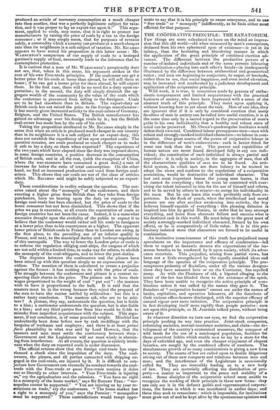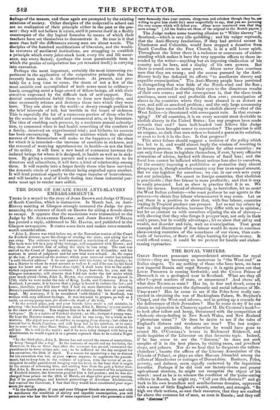THE COoPERATIVE PRINCIPLE: THE SANATORIUM. FEW things are more calculated
to leave on the mind an impres- sion that this old world—old when measured by man's conceptions, deduced from his own ephemeral span of existence—is yet in its infancy, than the hesitating and blundering manner in which the application of the great principle of combined exertion ad- vances. The difference between the productive powers of a number of isolated individuals and of the same persons labouring in combination—playing into each other's hands—is inadequately illustrated by the difference between arithmetical and geometrical ratios ; and men are beginning to conjecture, to augur, or forebode, rather than to see, that social happiness, and even moral elevation, may be increased and accelerated by a judicious development and application of the cooperative principle.
Wild work, it is true, is sometimes made by persons of enthu- siastic temperament and limited acquaintance with the practical business of society, who have been impressed with a sense of the abstract truth of this principle. They insist upon applying it, without knowing how to set about the task. Men of one idea, they are ignorant that if it is only by combined exertion that many faculties of man in society can be called into useful exertion, it is at the same time only by a sacred regard to the preservation of man's pride in his own individuality that a healthy and robust state of mind can be preserved. Mr. OWEN'S quadrangular institutes would defeat their own end. Combined labour presupposes men—men with robust and strongly-marked individual characters—to labour in com- bination. One great source of the power of coiiperative labour is in the difference of men's endowments : each is better fitted for some one task than the rest. The powers and capabilities of human nature are never found developed fully in any one indi- vidual; the constitution of each individual is always partial and imperfect : it is only in society, in the aggregate of men, that all the characteristic qualities of man are to be found. An arti- ficial system, in which men are from infancy to be trained to adopt the views and conform to the regulations of a cooperative association, would be destructive of individual character. The last and most important lesson the young man learns, is that he cannot do everything ; that he must be contented with exer- cising the talent intrusted to him for the use of himself and others, and to be served by others in return—to merge his individuality in the mass. But he can learn this truth profitably only from ex- perience. In the flush of youth, when the intellectual and moral powers are one after another awakening into activity, the boy believes himself capable of everything : this pleasing delusion is inspired into him by genial Nature, in order that he may attempt everything, and learn from alternate failure and success what is his destined task in this world. He must bring to the great mart of society a strongly-marked individual character, formed by his own efforts, or he is comparatively of little value. It is in this pre- liminary isolated state that characters are formed to be useful in combination.
Au instinctive consciousness of this truth has prejudiced many speculators on the importance and efficacy of combination—led them to regard as fantastic dreams the expectations of the im- mense benefits to be conferred by it upon society, which its advo- cates entertain. This prejudice, arising from partial views, has been not a little strengthened by the equally onesided ideas and language of the apostles of the cooperative principle. The pre- sumptuous pedantry of Socialists, under all the various designa- tions they have assumed here or on the Continent, has repelled many. As with the Pharisees of old, a bigoted clinging to the letter of the law has blinded them to the existence of the spirit. They have been unable to recognize the active principle of com- bination unless it was called by the names they gave it. The founders of " cooperative bazaars" cannot see under the names of banks, capitalists, and operative labourers, all the functions of their various office-bearers discharged, with the superior efficacy of natural vigour over mere imitation. The cooperative principle is in fact developing itself more rapidly than people perceive : men act upon this principle, as M. Jourdain talked prose, without being aware of it.
In whatever direction we turn our eyes, we find the cooperative principle pushing its way into practice. Joint-stock companies, colonizing societies, mutual-insurance societies, and clubs—the de- velopment of the country's economical resources, the conquest of wild lands for the use of a surcharged population, facilities for those provident habits which enable men to lay by a store for the days of enfeebled age, and even the cheaper enjoyment of elegant luxuries, are sought by the combined efforts of numbers. The simultaneous growth of so many combinations is giving a new form to society. The courts of law are called upon to decide litigations arising out of these new compacts and relations between man and man ; and the interference of the Legislature is occasionally called for. They are insensibly leading us to a new body of law. They are materially affecting the distribution of pro-
perty—a matter so important to the peace and stability of a
state. Some disciples of the cooperative school seem unable to recognize the working of their principle in these new forms: they
can only see it in the defunct guilds and superannuated corpora- tions, the forms in which it was manifested in earlier days; and these they seek to resuscitate : which is impossible, for institutions must grow out of and be kept alive by the spontaneous opinions and feelings of the masses, and these again are prompted by the existing relations of society. Other disciples of the coSperative school can
see no realization of their principle either in the past or the pre- sent : they will not believe it exists, until it present itself in a fleshly counterpart of the dry logical formulas by means of which their
teachers have set themselves to demonstrate it. So true is it that more than half the differences among men are about words. The disciples of the hundred modifications of Owenism, and the would- be restorers of medieval institutions, are struggling to establish a principle which every joint-stock bank, every fire and life assur- ance, nay every factory, (perhaps the most questionable form in which the genius of cooperation has yet revealed itself,) is carrying into execution.
Perhaps the most important, certainly the most interesting ex- periment in the application of the cooperative principle that has recently been made, is the Sanatorium. At present, and pro- bably for a long time to come, the doom of not a few of the most amiable and accomplished of both sexes must be celibacy— lonely struggling amid a huge crowd of fellow-beings, all with their attention engrossed by the difficult task of self-support. Pru- dential considerations forbid them to form new family-ties, and time necessarily relaxes and destroys those into which they were born. They are alone in the world—a dreary enough position in the brief intervals of toil, but terrible in the hours of sickness. This is especially the lot of a numerous portion of those who live by the exercise of the useful and ornamental arts, or by literature. The idea of enabling such persons, by a moderate annual subscrip- tion, to command when in bad health something of the comforts of a family, deserved an experimental trial ; and hitherto its success has been encouraging. The positive addition which the ultimate success of the Sanatorium will make to the happiness of the class for which it is intended—the increase of comforts in sickness, and the removal of worrying apprehensions in health—is not the limit of its utility. It will form a new bond of connexion between the isolated beings for whom it is designed, in health as well as in sick- ness. By giving a common pursuit and a common interest to its directors and subscribers, it will form a kind of relationship among them. It will reunite into a larger family those who have survived the domestic circle of youth without being engrafted upon another. It will lend practical sagacity to the vague impulse of benevolence, and will breathe a soul of kindly feeling into those industrial pur- suits most apt to render men selfish.



























 Previous page
Previous page